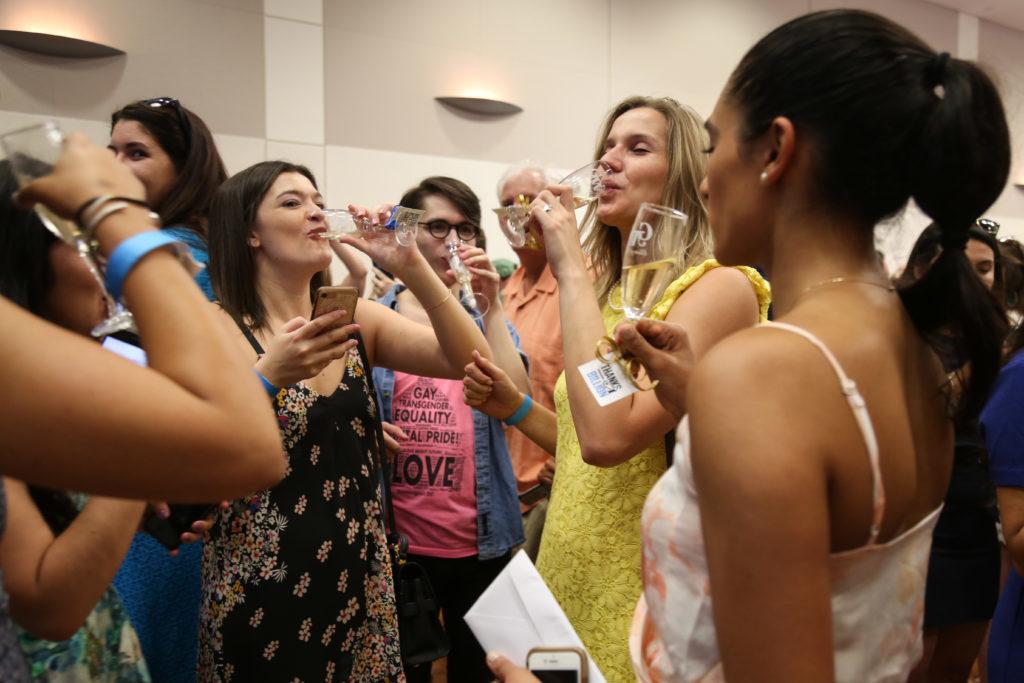The organizers of the senior class fundraising campaign are aiming to highlight the diversity of the Class of 2018 in this year’s effort.
Seniors Bethany Perez and Luke Scuitto, the campaign’s coordinators, said catering the campaign to students’ individual backgrounds will encourage higher turnout at events and help them achieve their goal of attracting the most recurring donations in class gift history.
Perez and Scuitto said they plan to engage more of the senior class by hosting events geared towards different groups and encouraging students, for the second straight year, to donate to organizations they were involved with during their time at GW.
“We’re a very diverse class with a variety of different interests and we want to make sure we highlight our diversity,” Perez and Scuitto said in a joint email.
To achieve their goals, Perez said in an interview that coordinators will plan new events and activities including creating a time capsule for seniors to bury student organization memorabilia, like club t-shirts, and a November event to showcase multicultural organizations with food from around the world.
“There’s still a lot of people I don’t know and I’ve been going here for forever, so we really want to allow people to show us what’s important to them,” she said. “Our student body keeps getting more and more diverse with every freshman class and we really want to highlight that because that’s an amazing thing about GW.”
GW has sought to increase the diversity of the student body in recent years and last year, officials said the Class of 2020 was the most diverse class ever. Of the 2,523 students admitted in 2016, about 20 percent came from underrepresented minority groups.
Perez and Scuitto said this year the campaign would again seek to attract reoccurring donations to the University, not just one-time gifts.
Last year’s seniors raised 25 percent more in donations than the previous year after prioritizing sustaining donations. By last May, about 25 percent of the senior class had committed to sustaining monthly gifts after graduation.
A week before the end of the campaign and the senior class gift announcement last May, coordinators sent out an email that they needed more students to donate to reach the campaign’s goal of 50 percent participation – a frequent mark of success in past campaigns. More than 1,000 students made a donation by the end of the academic year but there was no participation goal set by coordinators, University spokesman Brett Zongker said at the time.
This year’s coordinators said they will also place more emphasis on the use of social media in their campaign to reach more students and their parents. Perez said they will send more emails and revive the use of Twitter to communicate with students about different events and opportunities to donate.
“We’re ramping up the use of social media from years past so that seniors feel they can approach us with any questions about the campaign that they may have and about the different events we have planned for them,” Perez and Scuitto said in an email.
Perez said organizers are trying to increase the visibility of the campaign so that students and parents who are often unaware of the drive can be more informed and ask questions.
Michelle Poesy, the senior director of annual and special gifts at University of California-Davis, said using social media in fundraising campaigns can build a culture of philanthropy by allowing students and parents to stay updated on the latest developments.
“People are more likely to give to an institution if they’re following them on Facebook or Twitter, so engaging people through social media is a really great tool to build engagement that will lead to giving,” Poesy said.
Since 2015, the University has sought more donations from current students both through the senior class gift and the annual Flag Day, an event where students write cards to thank donors and are encouraged to make donations themselves. Last year’s Flag Day did not reach it’s goal of 500 student donations.
Richard Ammons, a senior consultant at Marts & Lundy, a fundraising consulting firm based in New Jersey, said universities can use senior gift campaigns to encourage lifelong involvement through fundraising and get students to see their institution as a “philanthropic priority.” The campaign’s focus on increasing sustaining gifts will help students adopt that mentality, he said.
“What they know is if they get young alumni into the habit of giving consistently in the years after they graduate then they’re more likely to continue to give and give larger amounts as their incomes increase,” Ammons said.





